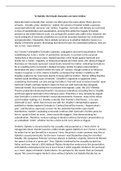‘In Hamlet, the female characters are mere victims.’
Diana Bornstein contends that ‘women are often given the same advice that is given to
servants… Chastity, piety, obedience.’ Indeed, the women of Hamlet exhibit a passivity
associated with both ‘servants’ and ‘victims.’ Together, Gertrude and Ophelia are restricted
to lives of subordination and sexualisation, proving that whilst the tragedy of Hamlet
pertains to the entire Elsinore court, it is perhaps the women who suffer most. However, the
moral ambiguity of Gertrude establishes an uncertain boundary between her victimisation
and perpetration. Meanwhile, fierce debate remains as to whether Ophelia’s lunacy is a
display of feminine protest, illustrating that whilst the pair are undoubted sufferers, they are
not, in fact, ‘mere victims’.
Act 3 Scene 4 exemplifies Gertrude’s passivity, subjugation and overt sexualisation, firmly
establishing her to be a ‘victim’ of patriarchal command. In contrast to his uncertain
melancholy in the previous scene, Hamlet launches a firm tirade against Gertrude and
brands her a ‘harlot.’ Arguably, as famously proposed by Ernest Jones, this ‘physical disgust’
illustrates an ‘intensely repressed’ sexual desire towards his mother, indicating Gertrude to
be an unwilling victim to Hamlet’s Oedipal Complex. Similar Freudian interpretations
dominated the play’s criticism within the early 20th century, though continue to influence
modern reception: in 2014, Valerie Schaeffer contended that Hamlet’s inability to kill
Claudius evidences his ‘innermost desires to sleep with his mother’, that by ‘killing Claudius,
Hamlet would be killing a part of himself.’ Schaeffer’s argument is supported when
considering that Hamlet can only avenge his father’s ‘foul and most unnatural murder’ upon
Gertrude’s death; perhaps Hamlet’s desire to have sex with Gertrude dies alongside
Gertrude herself, thus enabling him to proceed with regicide. Later, the 2017 Almeida
Theatre production showcased Hamlet’s incestuous inclinations as leading him to straddle
and thrust against Gertrude in this infamous scene. Therefore, it may certainly be argued
that Gertrude is a victim of Hamlet’s sexual advancements. However, many critics refute
such Freudian readings: A.C. Bradley contends that ‘Hamlet’s chief desire… is to save
[Gertrude’s] soul’, rather than to have sex with her. Bradley’s interpretation appears
justified for Hamlet implores Gertrude to ‘Confess [herself] to heaven, / Repent what’s
past’, and therefore, expresses concern for her potential damnation upon death.
Nonetheless, Hamlet’s unabating commands continue after Gertrude’s fruitless pleas for
him to ‘speak to [her] no more… these words like daggers’, thus demonstrating her
subordination. Therefore, various readings of Hamlet reinforce Gertrude’s presentation as
an undoubted ‘victim’, whether she be a victim to her son’s desire or disgust.
Similarly, Ophelia is characterised by her sexuality and presented as a ‘mere victim’ to
misogynistic ideals. Hamlet launches a bitter tirade against Ophelia in Act 3 Scene 1, wherein
he orders her to ‘get [herself] to a nunnery!’ Here, the prince’s crude comment may hint at
Ophelia’s sexual promiscuity, for the term ‘nunnery’ was Elizabethan slang for a brothel.
Notably, this juxtaposes Polonius’ previous allusion to Ophelia’s virginity, wherein he likened
her speech to that of a ‘green girl.’ Thus, Ophelia is defined by her sexuality by both her
father and lover. Hytner’s 2010 National Theatre Production underscores this presentation,
with Ophelia undressing to her bra in Act 4 Scene 5 which arguably reinforces her portrayal
as a ‘mere’ object of Hamlet’s lustful desire. It is perhaps for this reason that Lee Dewards
argues ‘We cannot imagine Hamlet’s story without Ophelia, but Ophelia literally has no




